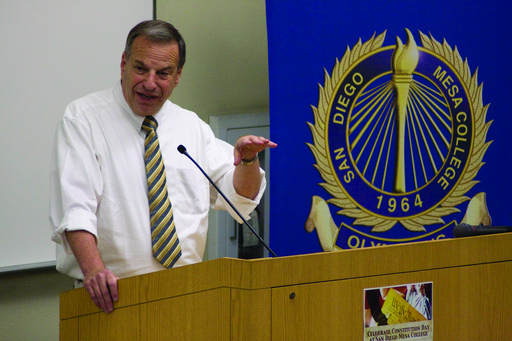September 17 marked the 223rd anniversary of the U.S. Constitution’s inception, and Mesa College commemorated the date by welcoming U.S. Rep. Bob Filner to speak on constitutional issues, specifically Arizona’s immigration law.
Filner is known as the state’s border congressman, dealing with California-Mexico relations from San Ysidro to Yuma. He taught history at San Diego State University for more than 20 years prior to holding office and was also a member of the Freedom Riders, a civil rights group that protested segregation in the South.
The congressman’s passion for civil rights hasn’t faded over the years. Filner sees the discrimination he witnessed in his youth reflected in Arizona’s State Bill 1070. The bill has raised much controversy, stating law enforcement officials have the right to ask for citizenship papers if someone looks like an illegal immigrant.
What exactly makes someone appear illegal has been the subject of debate since the bill was passed. Filner believes that the law is inherently endorsing racial profiling, specifically against Mexican-Americans.
“The racist police code of ‘driving while black’ has changed into ‘walking while brown,'” said Filner.
He sees this divide between law enforcement and people of Mexican descent as detrimental to public safety. The congressman believes a Hispanic witness of a crime may refuse to cooperate with investigators due to the fear of being identified as an illegal immigrant.
Several audience members thought the congressman was creating racial tension by making such assumptions about officers. Outspoken dissenters were offended by the speaker’s lack of faith in Arizona police and were also threatened by his suggestion that the border needs less surveillance.
Michelle Hawks, a political science major at Mesa College, agreed with Filner and believed he successfully addressed the bill’s faults, but wanted to hear more about the law in a historical context.
“He did a good job at making the issues understandable for people not associated with the southern border,” said Hawks, “however, I wanted to hear more about the historical comparisons between countries that require carrying citizenship papers versus the United States.”
The congressman recognized the fear Americans have of illegal residents taking their jobs. His solution to our country’s immigration problem is not extra exclusivity, but rather lending a helping hand across the southern border.
Filner addressed the unique relationship the United States has with Mexico. America, one of the richest nations in the world, borders one of the poorest and least stable countries. This stark contrast creates economic prospects that are extremely desirable for people south of the border.
He argues that stimulating the Mexican economy will make border hopping less appealing, thus cutting down on illegal immigration.
Mesa College student Ved Red agreed that leveling the playing field was a good idea.
“I liked his solution of bringing countries closer [economically] so that people don’t want to immigrate,” said Red.
Filner recommends aiding the foreign government with some of the excessive funding spent on border vigilance. However some are concerned about Mexico’s infrastructure and whether or not the country would be financially responsible with the funds they receive.
“How do we know that money is being used for the right things, and not for fueling corruption?” Hawks wondered.
California’s border congressman encouraged debate over this controversy, pointing out that such arguments are essential to the democratic process.

